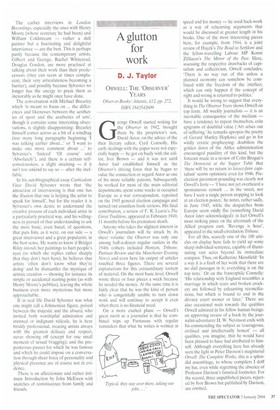A man who asked the right questions
Jane Rye
LONDON RECORDINGS by David Sylvester Chalk), £22, pp. 202, ISBN 0701162678 David Sylvester's first ambition was to be a professional cricketer, and he possessed to the end that almost miraculous masculine capacity for total recall of notable prep-school innings ball by ball. Later he tried to be a painter, and then a jazz saxophonist. Later still, the cinema being another of his great passions, he worked with Stanley Kubrick on Lolita — but by this time he was well established as an art critic. He is perhaps most widely known for his invention of the term 'Kitchen Sink School' and for his interviews with Francis Bacon which became a source of inspiration for a whole generation of artists .
This posthumous collection of interviews made between 1962 and 2001, with three short essays, is largely devoted to artists, but also reflects its author's love and knowledge of cinema, music and sport. There are interviews with Leonide Massine whom Sylvester, as a boy, had seen dancing at Covent Garden; with Ken Adams whose film sets, particularly for Dr Strangelove and the Bond films, he thought should be regarded as serious art; with the composer Harrison Birtwistle, who describes the last years of their friendship as 'a sort of intellectual love-affair'; and with the former England cricket captain and professional psychoanalyst Michael Brearley. The last of these interviews, with Harrison Birtwistle, was made just a few days before David Sylvester's death, and it is strange and moving to see the mind and spirit still so determinedly in action, business as usual, when the body is about to bring down the curtain. It is also a testament to his passionate curiosity about the processes of art and to his equally passionate belief in the importance of his own work, that they should persist when a lesser man might have been distracted by the prospect of imminent extinction. The earlier interviews in London Recordings, especially the ones with Henry Moore (whose secretary he had been) and William Coldstream — rather a dull painter but a fascinating and delightful interviewee — are the best. This is perhaps partly because the contemporary artists, Gilbert and George, Rachel Whiteread, Douglas Gordon, are more practised at talking about their work than their predecessors (they can seem at times complacent, their very articulateness becoming a barrier), and possibly because Sylvester no longer has the energy to press them as inexorably as he might once have done.
The conversation with Michael Brearley which 'is meant to focus on ... the differences and likenesses between the aesthetics of sport and the aesthetics of arts'. though it contains some interesting observations, is slightly disappointing: Brearley himself comes across as a bit of a windbag (too many long paragraphs beginning 'I was talking earlier about...' or 'I want to make one more comment about ...' to Sylvester's 'Indeed' Of course' and 'Absolutely'), and there is a certain selfconsciousness, a slight straining — if it isn't too unkind to say so — after the ineffable.
In his autobiographical essay Curriculum Vitae David Sylvester wrote that 'the attraction of interviewing is that one has the illusion that one is helping the artist to speak for himself', but for the reader it is Sylvester's own desire to understand the creative process of each individual artist in a particularly practical way, and his willingness in pursuit of that understanding to ask the most basic, even banal, of questions, that puts him, as it were, on our side — a great interviewer and a great popularist, in the best sense. He wants to know if Bridget Riley intends her paintings to hurt people's eyes (to which she replies rather sharply that they don't hurt hers); he believes that artists 'often don't know what they're doing' and he dismantles the mystique of artistic creation — showing for instance its simple or accidental starting point (as with Henry Moore's pebbles), leaving the whole business even more mysterious but more approachable.
If in real life David Sylvester was what one might call a Johnsonian figure, poised between the majestic and the absurd, who invited both worshipful admiration and stunned or indignant ridicule, he is here briskly professional, treating artists always with the greatest delicacy and respect, never showing off (except for one small moment of sexual bragging); and the preposterous pauses for which he was famous and which he could impose on a conversation through sheer force of personality and physical presence are of course not in evidence.
There is an affectionate and rather intimate Introduction by John McEwen with snatches of reminiscence from family and friends.



























































 Previous page
Previous page